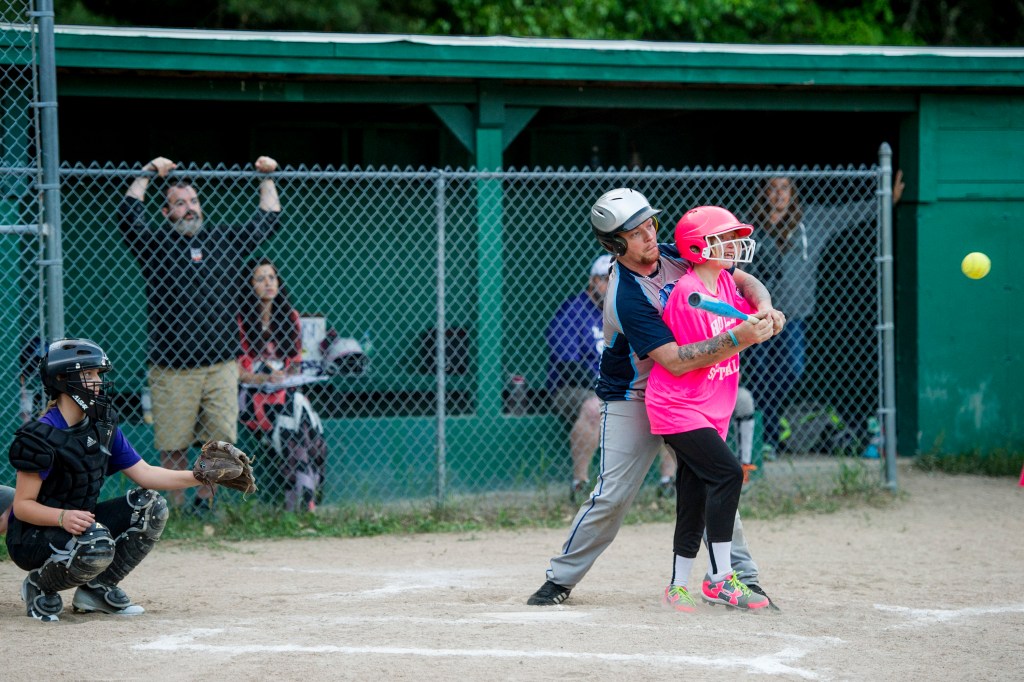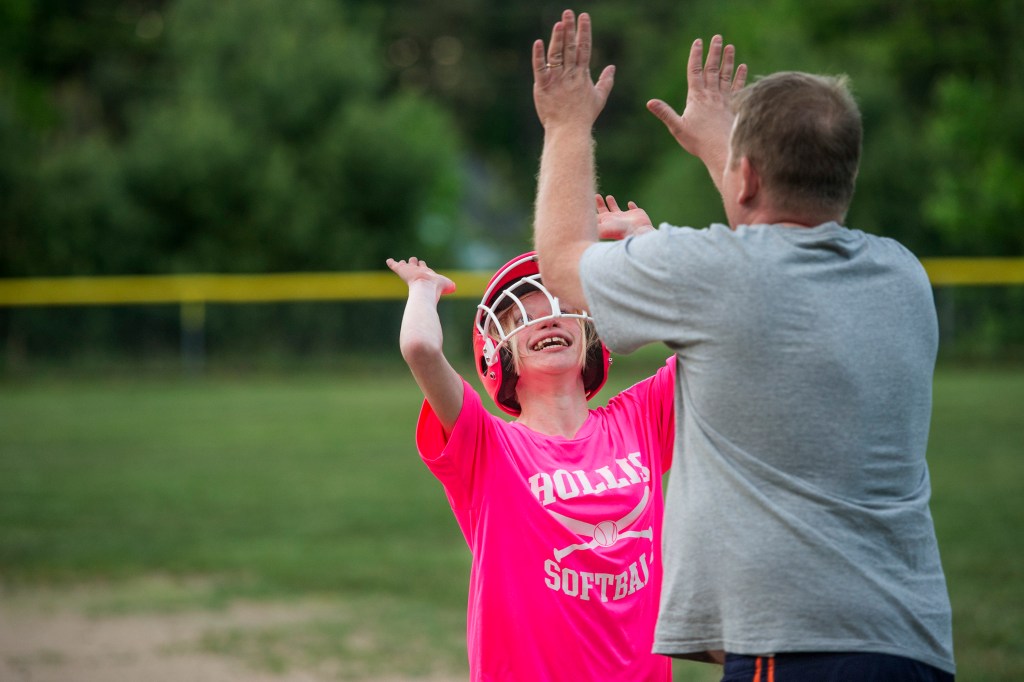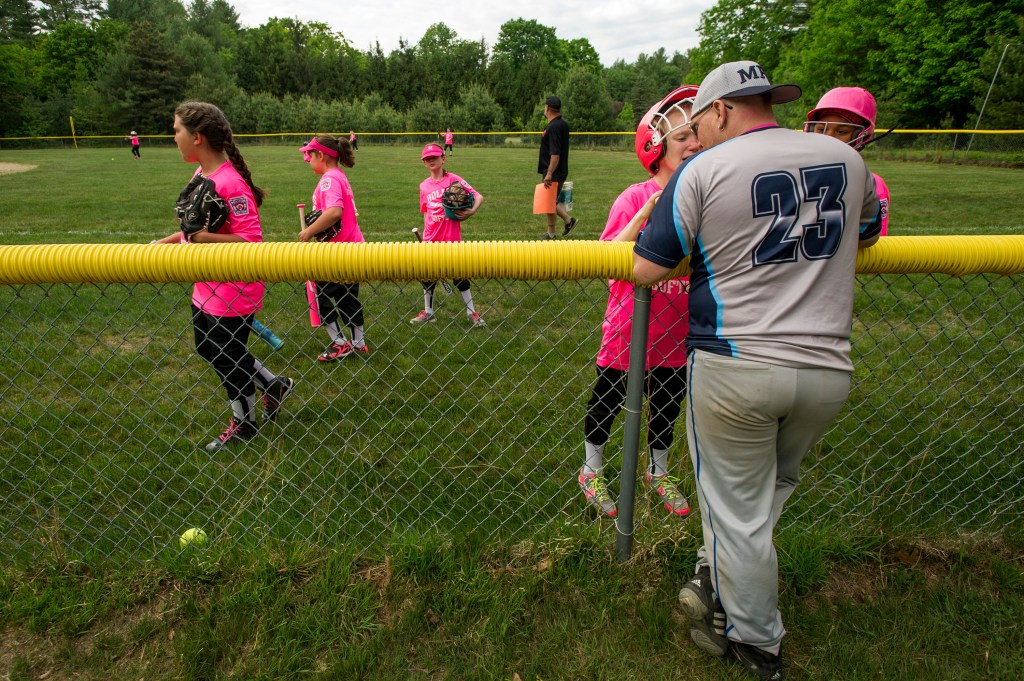HOLLIS — Lexi Nevells swings a softball bat with a chopping motion. She practices a lot with her dad and every so often makes contact with a pitch.
It happened Wednesday night in the third inning of her Hollis Minors Little League softball game at Clarks Mills Field against the visiting Nor’easters from Standish. The 12-year-old with a wide smile and a rare developmental disorder grounded out to first base.
Her second and final at-bat was more typical. She swung at three pitches and missed them all, at which point her father, Scott Nevells, strode to the plate and joined her in the batter’s box, his feet a bit wider apart, his hands on her hands.
Before the next pitch came in, however, the Standish catcher left her position and walked to her dugout.
“She said, ‘I’m not playing if he’s on the field,’ ” Nevells said.
After reassurance from her dugout – “It’s all good,” she was told – the catcher returned. Father helped daughter poke a dribbler to the mound, and Lexi wound up being safe on an overthrow.
The catcher’s initial reluctance stemmed from an incident two weeks ago between the same teams on the same field that raised questions about parents assisting special-needs children in organized sports.
National Little League rules prohibit parents on the field. Local and district officials have told Scott Nevells that he should no longer help his daughter bat. He says he will continue to do what he and, at times, his ex-wife have done in past seasons.
“Mostly it’s dad but sometimes it’s mom,” said Robin Minor, whose daughter, Sage, has been Lexi’s teammate for the past three seasons. “All the other years have been great. It’s pretty sad that softball had to turn into something like this.”
“Something like this” is the social media firestorm that includes an online petition with nearly 1,000 supporters, a statement on the league’s Facebook page to clarify what many view as misleading assertions in the petition and an appeal for more responsible adult behavior.
“It’s been blown way out of proportion,” said Tracy Nevells, Lexi’s mom.
Let’s start with Lexi. She has Mowat-Wilson syndrome, which slows development in speech, intelligence and physical abilities. She speaks, but not in full sentences.
“There’s only about (200) to 300 people in the world who have it,” Tracy Nevells said. “Most kids with it don’t ever get potty trained.”
Lexi did so at 9. In addition to softball, she plays recreational soccer and basketball. She wrestles. She does cheerleading and therapeutic horseback riding.
“Her whole life has always been around sports,” said Scott Nevells, who even takes his daughter snowboarding by holding beneath her armpits to help her balance next to his board. “I’ve never excluded her because of her abilities.”
Lexi has been playing organized softball for at least four years. Hitting off a tee proved problematic, so her father stood behind her to help her swing at pitches to make contact. In previous seasons at lower levels, that never posed a problem.
This year, Hollis switched from Cal Ripken to Little League, with kids – instead of coaches – doing the pitching. Games are played against teams from nearby towns including Baldwin, Standish and Hiram. An email sent to league officials at the beginning of the 12-game season explained the situation with Lexi and her father.
Three weeks into the season, a Standish parent saw Scott Nevells on the field and objected. Accounts vary, but it seems clear that there was shouting and harsh words.
Two days later, Hollis played again, and this time a Little League umpire asked Scott Nevells to wear a helmet while he stood behind Lexi and to only hold her arms and not touch the bat. He agreed to wear the helmet, and put his hands on hers instead of on the bat above and below hers.
He said he also was asked to submit to a background check, as is required of all Little League coaches.
“I did one six months ago when I coached (youth) football,” he said. “I have no issues with that.”
Being forced to wear the helmet, however, seemed to rankle him. When he removed it in anger, disgust or frustration, he did not place it gently on the ground. Tracy Nevells, who was married to Scott for six years, said her ex-husband can be loud and abrasive at times. He said people see tattoos on his arms and his mohawk haircut and leap to judgment. Now 33, Nevells, who has remarried, is a welder who still plays softball, baseball and semi-pro football. He was a high school wrestler who coaches in the Bonny Eagle youth program.
“I’m not a butt kisser,” he said. “When it comes to my daughter, I’m definitely outspoken.”
Hollis is part of Maine Little League Baseball and Softball District 6. Steve Cole, the District 6 administrator, got wind of the situation and said Nevells should not be on the field.
“It’s a safety issue, plain and simple,” Cole said. “It interferes with the process of the game and the children playing peer to peer. … This pulls at your heartstrings. There’s no two ways about it. I applaud Mr. Nevells in what he’s doing, but not in the way he’s pursuing it.”
A phone conversation between the two men did not end amicably.
“His language became profane and he became out of control,” Cole said. “I don’t use foul language and I don’t expect it to be used against me.”
A petition titled “Let Lexi play!” appeared on change.org with a photo of Lexi wearing a batting helmet, her arm around her dad. The author is listed as “Concerned Parent.” Scott Nevells said he didn’t write it and doesn’t know who did, but he suspects it was a friend who wishes to remain anonymous.
When Lexi made contact Wednesday night, her father said it was the fourth or fifth time she had done so in three years, but the second time in two weeks.
“It’s about time you start hitting,” he said to her after the inning, a gleam in his eye. She gave him a hug.
Officials of Hollis Little League say there was never any consideration of not letting Lexi play.
“Things are being taken out of context,” said Jean Grenier, league president. “We have done everything we can to have Lexi continue to play on the team.”
Suggestions from Cole and from the league to accommodate Lexi’s special needs included using a tee, swinging without her father’s assistance or taking part in a Little League Challenger Program, currently available only in Portland, South Portland and Biddeford.
Paul McLellan has been running South Portland’s Challenger program on Sunday afternoons for four years. He said 17 kids are currently registered and usually about a dozen show up on a given day. Players with special needs have buddies who help protect them from hard-hit balls.
“There’s no such thing as winning or losing, no such things as outs,” McLellan said. “It’s just hit and run the bases.”
Lexi’s parents said she wouldn’t know anyone in the Challenger program, that it would present logistical problems to get her there and that she prefers to play alongside her friends.
“She’d be alone and not know any of the kids,” Scott Nevells said. “Right now she plays with all her friends. To her, she’s one of the regular kids on the team.”
Kristin Aiello is a managing attorney at Disability Rights Maine, a federal and state agency that advocates for the rights of Maine citizens with disabilities. She said she can’t speak on the merits of this case or on behalf of any party, but that Little League is a public accommodation covered by the Americans with Disabilities Act (ADA).
“An important right under the ADA is the right to reasonable modifications in rules, policies and procedures to allow people with disabilities access to goods, services and programs offered in their communities,” Aiello said in a written statement.
Any failure to make reasonable changes could constitute discrimination, Aiello said, unless it would “fundamentally alter the nature of its activity, is a significant difficulty or expense, or if the requested modification would pose a direct threat to the safety of others.”
Two games remain for Lexi and her teammates. Scott Nevells said he plans on continuing to help his daughter, whose team is scheduled to play next Monday and Wednesday.
Cole said his goal is to avoid any more altercations and to allow all the children in the program to enjoy the rest of the season. That is why he pulled official Little League umpires off the games, which will still count.
“Just let the kids play,” he said. “If he feels he has to go out to assist her, so be it, as long as he behaves.”
“I would love for her to do it all by herself,” Scott Nevells said of Lexi hitting. “But if she did it all by herself, she might get two hits all year and strike out all the time, which would be disturbing to any kid. I just guide the barrel. I never want anybody to let her on base. If she gets out, she gets out. But to see her running down the first-base line, as a parent, there are no words to put on that.”
CORRECTION: This story was updated at 10:57 a.m. on June 2, 2016 to clarify that Scott Nevells has remarried but Tracy Nevells has not.
Send questions/comments to the editors.







